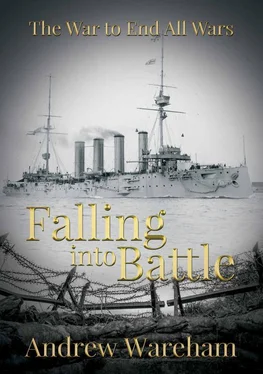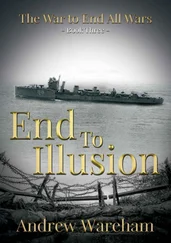“So say I! What’s the time? Sun’s over the yardarm. Time for a pinkers, I think.”
Hector had not developed a taste for pink gin, excused himself on the grounds that he was soon on watch.
The weather continued foul and it was impossible to exercise the guns live firing. The maindeck six inch sponsons were unusable, flooded out by the high seas; their crews spent their watches huddled on the messdecks, shivering in their winter coats. The upper deck guns could be manned, but it was impossible to take an aim, rolling and pitching through thirty feet.
There was nothing to worry about, was the general opinion. Good Hope was a fine sea boat and the Germans were half an ocean away.
“Good experience, that’s all – look well on your record of service, young McDuff.”
Lieutenant Christopher Adams was worried – he was close to committing a social faux pas, he feared.
The flagship was by its very nature the epicentre of any anchorage. Scapa Flow had no social life, for the lack of a civilian population, but at intervals Iron Duke sailed south for Queensferry and the services of the yard there. On such occasions the blue-blooded of Edinburgh flocked aboard to be entertained, bringing with them their eligible daughters.
Christopher was too young, too junior, to be regarded as a match for any of the girls he met, as they all knew. That had not stopped the youngest daughter of the Duke of Blair from wishing to know him better. She was only eighteen, barely out, but obviously knew her own mind and had mounted hot pursuit of him.
To an extent it was very flattering, he admitted to himself, but lieutenants could not marry and even lieutenant commanders aboard battleships were regarded at askance if they should do so. Was he to offer marriage he would soon find himself on the flag-captain’s carpet and ousted from the flagship. If he was to be so supremely unwise as to consider extra-marital relations with the daughter of a duke, he could expect a rapid court martial and a dishonourable discharge for conduct unbecoming an officer and a gentleman. Then he would be morally obliged to join the Army, quite possibly without a commission. He had heard down the grapevine that the idiot youth Baker had been taken on as a brown job – he could not imagine himself reduced to such an expedient.
There had been a dinner the previous evening and the dear girl had attached herself to him most prominently. The officers were to attend a dance on shore that day – not so formal as a ball, but a society event. She would be there, in the company of her doting parents who seemed to favour her pursuit.
Christopher took advice of the Commander, his cousin.
“What am I to do, sir?”
“Well, my boy, I am sure you are not asking me to explain the birds and the bees!”
The Commander seemed to think that was remarkably witty.
“No, sir.”
“Let me see – you cannot offer marriage - and would be most unwise to offer anything else! You cannot avoid her company. There is no way to cold-shoulder the dear girl. Smile sweetly and dance with her tonight. I will speak to the captain and he will buttonhole Jellicoe in person. We will come up with something, my boy!”
A day later Christopher found himself posted, aide to the Rear Admiral of a pair of battlecruisers detached to the Mediterranean Fleet and expected to form the nucleus of a squadron there.
“To Cyprus, in the first instance. The squadron to watch the Suez Canal for any raids by the Austro-Hungarian fleet and to be available in case the Turk chooses to take action against us. The Ottomans are expected to join in soon, probably on the wrong side. The government has been trying to persuade them to join us, but it seems likely to be unsuccessful, mainly because we are allied to Russia, their great enemy, though that silly business with Breslau and Goeben did us no good! Sailing from Portsmouth at the end of the week, so we shall send you by destroyer to Newcastle where you can pick up the railway south. You should manage to be in London tomorrow evening, twenty-four hours at most.”
It was less than ideal for Christopher’s career, but it seemed to offer the possibility of action, which might almost compensate for the lack of proximity to Admiral Jellicoe.
“Thank you, sir. Which admiral?”
“Tompkins. Recently made. Did well on the China station as a commodore of a squadron on the Yangtse.”
Christopher was appalled – a river gunboat man! He could know nobody and nothing.
“You will have to guide him, I do not doubt, Adams. He will not be aware of the subtleties, shall we say, of dealing with the foreign governors and such, not to speak of the Colonial Office chaps on Cyprus, civil servants and considerably more Byzantine than the inhabitants of Constantinople! You will probably be called down to Alexandria on occasion – need to deal with the types there. I don’t know why you are not to be based out of Malta, but no doubt that will become clear. I suspect that your squadron will include a number of pre-dreadnought battleships, possibly to be used to bombard Austrian ports on the Adriatic. Could be good fun, you know!”
Ancient ships; employed in a backwater; an unknown admiral – there were words other than ‘fun’ that came to Christopher’s mind.
“So it could, sir. Uniforms could be a problem, you know, sir!”
“Gieves has a branch in Malta. No difficulties there. Bound to pay respects to C-in-C Mediterranean Fleet – you can expect to be there for several days. All the important things can be dealt with, you know. Should be a jolly good cruise, old chap. Better than spending a winter in Scapa Flow!”
The weather had been bad enough in the summer; the thought of escaping the northern wastes for their six dark months quite reconciled Christopher to the prospect of unfashionable service with an unknown.
He took the train in Newcastle full of hope for a pleasant Mediterranean interlude. He spent twenty-four hours in London – back in civilisation – spending the day with his parents for feeling that he really should make his number in the family home.
The Viscount was based in London for the duration of the war; a sacrifice but necessary, as he explained to his third son.
“The House of Lords is sitting almost unbroken – no long recesses these days. I put my nose inside for a couple of hours two or three times a week. Besides that, I am on a couple of committees set up to organise the country for the purposes of the war. Contracts for munitions, that sort of thing, making sure the right factories are kept busy, you know what I mean.”
Christopher suspected he did – the family income would be taking a turn for the good by the sound of it.
“Jeremy will not be taking a commission, of course; one cannot expect the heir to do so. He has made himself useful, though. The Ministry of Agriculture needs advisers and has set up one or two ‘statutory bodies’, they call them, to organise food production and encourage farmers to turn pastureland to wheat and such. Keeps him busy for a couple of days a week.”
That seemed entirely reasonable – he could not be expected to give all of his time to government.
“There is an honorarium, of course, and he will be able to look after our lands properly. We do have some ancient pastures that should not be wantonly destroyed.”
To be expected – there was a limit to the sacrifices demanded of the leaders of the country.
“Arthur has joined up – as second son, he was obliged to, he felt. He has been sent out to General Sir John French’s staff, has been made a captain, of course. Played some part in the planning for the Battle of the Marne, I understand.”
“Very good, Father.”
“What of you, Christopher? I do not quite understand how you are sent to the Mediterranean. I had thought you were well-placed with Jellicoe.”
Читать дальше












